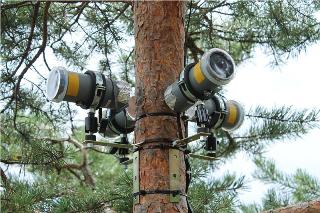Nov 30 2015
This media-art installation was created as part of the project trees: Rendering Ecophysiological Processes Audible, run jointly by ZHdK and WSL.
 Wired pine in the Swiss Valais: various sensors record the physiological processes in the tree and the ultrasounds it produces. Photo: Reinhard Laessig / WSL
Wired pine in the Swiss Valais: various sensors record the physiological processes in the tree and the ultrasounds it produces. Photo: Reinhard Laessig / WSL
Hollande experienced the installation first-hand at ZHdK's Institute for Computer Music and Sound Technology on 16 April 2015 during his state visit to Switzerland. He subsequently invited its creators to exhibit it at the World Climate Summit.
Wired for the sake of art and science
The aim of the trees project is to make tree noises perceptible in artistic form. Tree metabolism creates a variety of sounds that are not normally audible to humans. This project, which ran from 2012 until 2015, was carried out by ZHdK sound artist Marcus Maeder and ecophysiologist Roman Zweifel from the WSL Forest Dynamics Research unit. They charted the noises and metabolic processes of a Scots pine in the Swiss Alps with special sensory equipment. Maeder then used computer technology to convert the data recorded during the research, such as stem diameter variation and sap flow in the branches, into sounds.
Most of the noises occurring in a plant are caused by drought stress. Thirsty plants make inaudible noises that tell us both about their own condition and their environment. The observation system used in the project allows researchers to find out how plants respond to increasingly long periods of heat and drought.
ZHdK's audio installation will be on show in Hall 3 of the Parc des Expositions Paris-Le Bourget from 30 November until 11 December 2015.